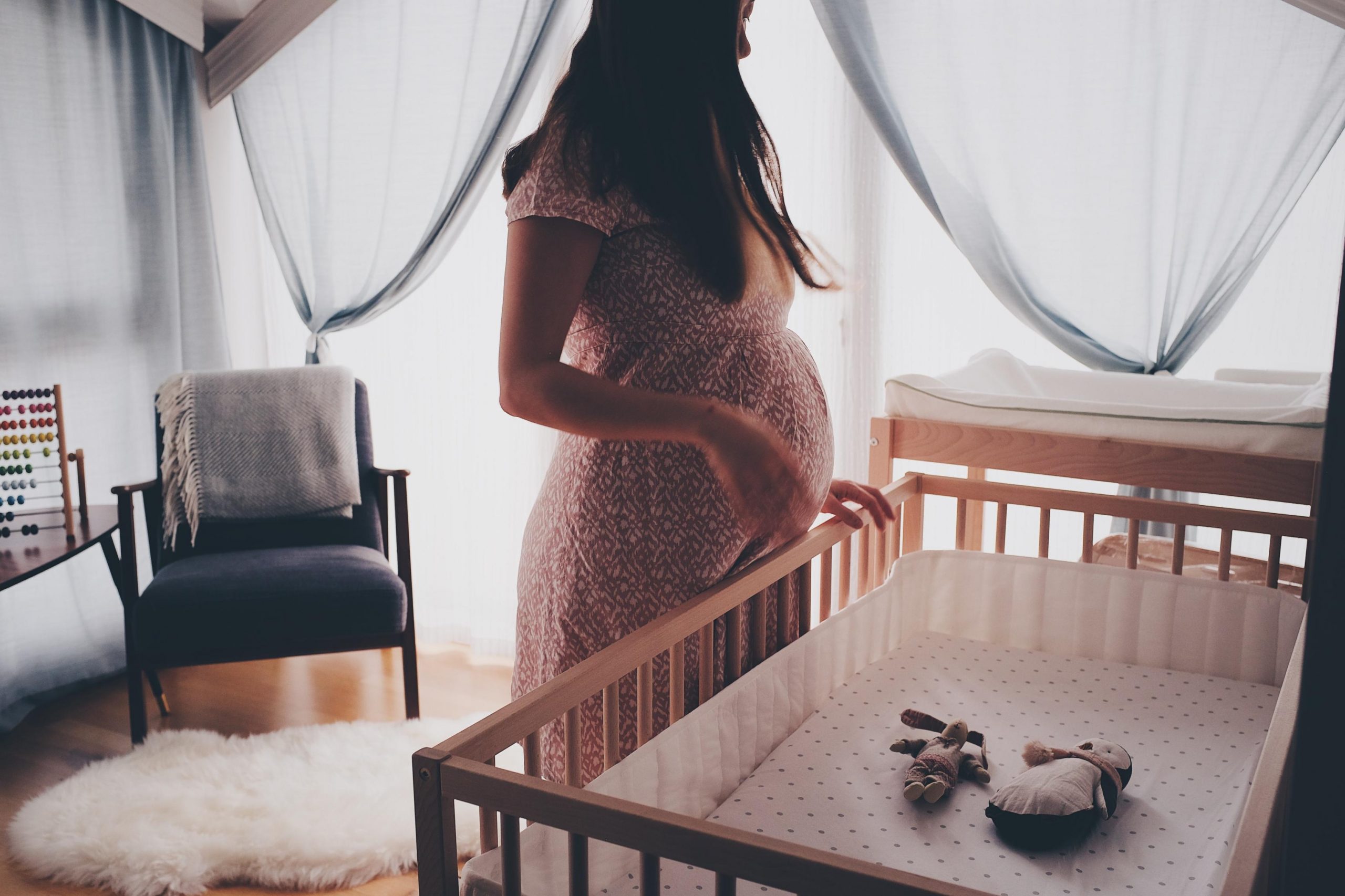Starting the journey of parenthood can be joyful, emotional, and overwhelming all at once. As sensitive as pregnancy is, the time after childbirth is delicate as well, both for the child and mother. Many women could experience a spectrum of mental and emotional complications during this time. More often than not, these are one of the types of perinatal mood and anxiety disorders or PMADs. Symptoms of PMADs could appear anytime during pregnancy until the first year after childbirth. Here’s everything you need to know about the types of PMADs, the symptoms, and the treatment.

PMADs can cause emotional, physical, and mental distress to women during pregnancy and even after childbirth.
What Are Perinatal Mood And Anxiety Disorders?
In simple terms, perinatal mood and anxiety disorders, or PMADs, are a spectrum of symptoms that can cause emotional, physical, and mental distress. These complications usually affect women during pregnancy and the postpartum period. But in some cases, it could affect new parents, partners, and adoptive parents as well. PMADs affect many people and are considered to be one of the top complications of pregnancy and childbirth.
While the onset of symptoms could be gradual or sudden, it’s important to recognize these symptoms and reach out for help at the earliest. Most types of PMADs are temporary disorders for which treatment is available. Let us now have a look at the symptoms of different types of PMADs.
Symptoms Of PMADs
People suffering from PMADs could experience a wide range of symptoms. These could range from sadness and fatigue to anger and guilt, and everything in between. Remember that symptoms could vary based on the different types of PMADs. Symptoms could also vary from person to person or from pregnancy to pregnancy. These symptoms could be physical as well as emotional. Some of the common symptoms that people with PMADs could experience are:
- Feeling anxious or panicky
- Self-doubts and relentless worry
- Feeling a sense of loss of control
- Feeling restless and irritable
- Loss of or gain in appetite and weight
- Persistent headaches
- Dizziness or light-headedness
- Heart palpitations or hyperventilation
- Feeling guilty for not being a good mother
- Trouble focusing and remembering things
It’s important to keep in mind that these symptoms and their intensity could vary with every individual. One may experience some or all of these symptoms depending on the types of PMADS they are going through. If you’re experiencing any such symptoms or notice your partner going through them, it’s important to reach out for help.
Causes Of PMADs
While there isn’t a single cause linked to the onset of PMADs, there are a few risk factors that could play a role. Some of these risk factors include:
- Hormonal changes or drop in estrogen and progesterone levels post-delivery.
- Fatigue and stress.
- Major life changes like job loss, illness, isolation, moving to a new city, etc.
- Lack of support from partner, friends, or family.
- Personal history or family history of depression, mood or anxiety disorders.
- As per studies, a few mood disorders could also have a genetic component.
- Prior trauma such as a grave accident or sexual assault.
- Fear of childbirth, having gone through fertility treatments, or through a difficult birth.
Types Of PMADs
Most women experience a wide range of emotions during the first few weeks after childbirth. These emotions could also include sadness and irritability. In common terms, these emotions are often referred to as baby blues. It’s important to not confuse baby blues with either of the types of PMADs. Baby blues are not a mood disorder. It’s a rather normal adjustment phase when pregnancy and postpartum hormonal changes calibrate. However, if the symptoms persist for over two weeks after childbirth, it could be a type of PMADs. Some of the main types of PMADs are:
Perinatal Depression
One of the most common types of PMADs is perinatal depression. Symptoms for perinatal depression could range from feelings of guilt and distress to suicidal ideation and sleep disruptions. It could leave a woman feeling overwhelmed and unable to cope with the daily tasks of motherhood. Some women might even feel withdrawn and isolated or may fear being left alone with their newborns. Perinatal depression could develop anytime during pregnancy, though it usually emerges during the first few weeks after childbirth. Some women could also experience postpartum depression.
Perinatal Obsessive-Compulsive Disorder (OCD)
OCD or obsessive-compulsive disorder is often related to anxiety. It could cause women to experience obsessions or intrusive thoughts and compel them to perform repetitive behaviors or compulsions. Symptoms of perinatal OCD include unnecessary worry about their baby, constantly checking on their napping baby, obsessively praying to protect their baby, etc. Not just adults, but young children could also be diagnosed with OCD. A combination of medications and cognitive behavioral therapy techniques would work best to treat OCD in both adults as well as children.
Postpartum Post Traumatic Stress Disorder (P-PTSD)
Women who experience a traumatic birth are likely to develop PTSD. Some common symptoms include difficulty sleeping, nightmares about labor and delivery, anxiety and panic attacks. Some women could also get flashbacks of the trauma with feelings of anxiety. Women who have lost a pregnancy might also develop PTSD. In such a scenario, it’s important for the individual to express their feelings. A healthcare professional might recommend therapy and medications to treat individuals with PTSD.
Perinatal Anxiety
Another common type of PMADs is anxiety or panic attacks. New mothers or first-time parents could have extreme worry about their baby’s health and safety. Some women could also experience chest pain or breathlessness, especially if they’re having panic attacks because of anxiety. Therapy and relaxation techniques like meditation could help people cope up with perinatal anxiety. In extreme cases, some medications could also be prescribed by a healthcare professional.
Postpartum Psychosis
Out of the different types of PMADs, postpartum psychosis is the most serious condition that requires immediate diagnosis and treatment. Deep depression, mania, paranoia, insomnia, erratic behavior, and extreme agitation are some of the common symptoms of psychosis. Hallucinations can also be a common occurrence with people diagnosed with psychosis. Such individuals might have persistent thoughts of harming themselves or their baby. That’s why it’s important to reach out for help at the earliest if one notices any symptoms of psychosis.
Perinatal Bipolar Mood Disorder
Bipolar mood disorder often combines two intense mood episodes – mania and depression. These episodes could be cycling at different rates and extremes depending on the type of bipolar disorder the person is experiencing. Suicidal thoughts, restlessness, irritability, and loss of interest in most activities are some common symptoms of bipolar mood disorder. In some cases, a person might already be suffering from this disorder but gets diagnosed only in the postpartum period. A mental health professional would be best equipped to provide treatment for perinatal bipolar mood disorder.
Treatment For PMADs
A mental health professional is the one that’s best equipped to provide treatment for PMADs. Usually, treatment plans vary with the types of PMADs a person is going through. In most cases, the plans would be a combination of medications and therapy. But this would also depend on the severity of symptoms and the individual’s health history.
A healthcare professional is likely to conduct a complete medical examination as well as a psychiatric evaluation before prescribing the treatment plan for PMADs. Some self-help techniques and counseling sessions with a counselor could also help. You can also consider joining a parenting community or a support group to connect with people going through similar situations.

Women suffering from either types of PMADs will need extra care and support from their loved ones.
Conclusion
As important as it is to take care of oneself during pregnancy, taking care of oneself after the birth of your baby is equally important. You’re likely to be busy with providing for your child’s care after birth but it’s also important to not neglect your own health in the process. Just make sure to take care of yourself and focus on your diet and exercise. If you notice symptoms of any of the types of PMADs, don’t hesitate to ask for support. Reach out to your doctor for help and clarify any doubts that you have.
As for your child’s health, there are many apps for parents that can help you in your journey of parenthood. One such app is ImmunifyMe that helps you keep digitized records of your child’s vaccinations. Along with that, it also sends you daily reminders of your child’s immunization schedule. This way you won’t have to compromise on your child’s health while taking care of yourself.
FAQs On Types Of PMADs
What Is The Most Common Perinatal Mental Illness?
The most common mental illness prevalent during the perinatal period is depression. It could affect some women during pregnancy or even after childbirth (postpartum depression). While there’s no definitive way to prevent perinatal mental illness, it’s important to support and take care of the person affected by the illness. Not just during the pregnancy phase, women also need care and support during their postpartum recovery.
What’s The Difference Between Prenatal And Perinatal?
The term prenatal often refers to the time before birth whereas the term perinatal mainly refers to the collective period before and after birth. The perinatal time period comprises both the prenatal period and the postnatal or postpartum period.
What Causes Perinatal Mental Illness?
As of now, there isn’t any direct cause linked to perinatal mental illness or types of PMADs. There are, however, a few risk factors that contribute to the development of perinatal mental illness. These include traumatic pregnancy or birth, hormonal changes, social isolation, financial or relationship stress, etc. Some previous reproductive issues such as infertility could also cause perinatal mental illness.
What Are The Types Of PMADs?
The most common types of PMADs are:
- Perinatal Depression
- Perinatal Obsessive-Compulsive Disorder (OCD)
- Postpartum Post Traumatic Stress Disorder (P-PTSD)
- Perinatal Anxiety
- Postpartum Psychosis
- Perinatal Bipolar Mood Disorder






